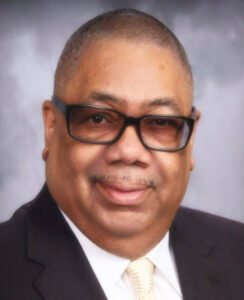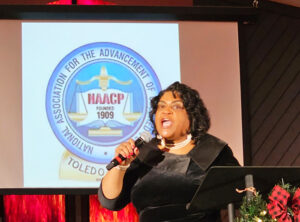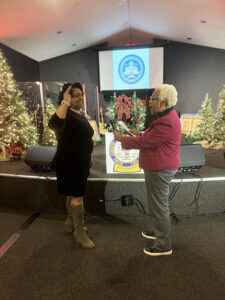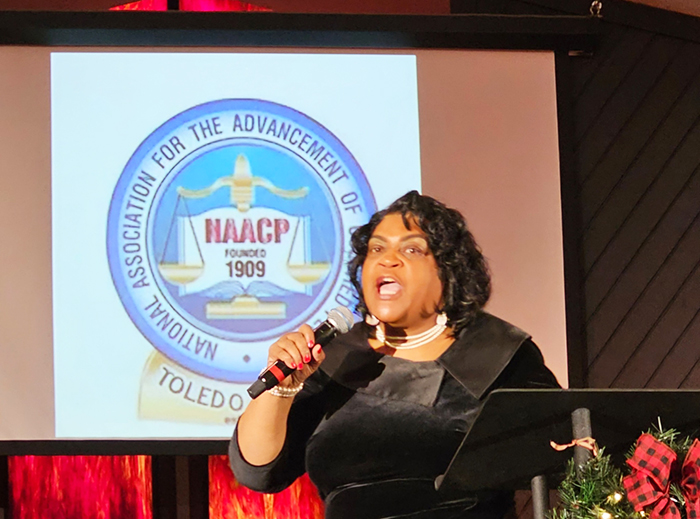
By Rev. Donald L. Perryman, Ph.D.
The Truth Contributor
I’m not your bridge over troubled waters; I’m the person who’s going to trouble the waters.
– Darlene Sweeney Newbern
Civil Rights and Justice leaders who utilize disruption as a change strategy are often labeled “radical” or “revolutionary” to silence them by protectors of the status quo. The intent is to force leaders and their organizations into compliance, making them docile, passive and palatable for those in power.
Yet, for Darlene Sweeney Newbern, these labels are not deterrents but badges of honor, reinforcing her commitment to troubling the waters rather than going quietly into the night.
Not to be confused with “reformers,” who operate within the existing system, because it often works to the benefit of the so-called reformer, Newbern seeks to dismantle systems of oppression, tear down what is broken and create space for equity and justice to flourish.
She is a leader who pushes the envelope, refusing to settle for superficial progress. And most of all, she challenges not only systems of oppression but also leadership paradigms that prioritize self-interest over collective liberation or seek justice for a select few rather than for everyone.
As Newbern assumes the reins of the Toledo chapter of the NAACP, she brings a leadership style that is uncompromising, unconformable, unrelenting, and unapologetic in her pursuit of justice.
I caught up with Newbern to discuss what it means for her not only to navigate troubled waters but to actively disrupt them, creating the ripples that lead to systemic change.

Perryman: Congratulations on your recent election as president of the Toledo Chapter of the NAACP. Let’s begin by discussing your vision for the chapter.
Newbern: My primary vision is to reestablish the Toledo Chapter as a force to be reckoned with in social justice. We want to be the premier civil rights organization in Toledo. Historically, this city played a significant role in the Civil Rights Movement, and my goal is to restore that legacy. Whether it’s healthcare equity, education, economic empowerment or criminal justice reform, we’re here to advocate for equality and make meaningful change. When you wrong the people in Toledo, Ohio, you will say to yourself, “Am I going to hear from the NAACP?” Yes, you are. You’re going to hear from the NAACP!
Perryman: What inspired you to take on this leadership role?
Newbern: Civil rights advocacy has been in my blood for as long as I can remember. Growing up in Toledo, I experienced discrimination firsthand but also had mentors who inspired me to fight for justice. From my time at Bowling Green State University to my long career with the Ohio Civil Rights Commission, I’ve always been drawn to defending the marginalized and holding systems accountable. When our former president, Rev. Willie Perryman, stepped down, it felt like a natural progression for me to pick up the torch and continue the fight.
Perryman: The times and circumstances of our experiences shape us. In fact, Soren Kierkegaard, the philosopher, said, “Life must be lived forwards, but can only be understood backwards.” Help our readers connect the dots to understand how your passion for justice was forged, specifically.
Newbern: My drive comes from a deep spiritual foundation. I grew up in the Church of the Living God as a child. I remember how the leaders used to stand up there and how they just fought for the belief.
From there, I had such outstanding teachers like Ernie Jones when I went to Jesup W. Scott High School (Once a bulldog, Always a bulldog!), who talked about the struggle of what it was to be Black not only in Toledo but also in America. They further instilled that fight for equality in me.
I ended up getting a job at The Ohio Civil Rights Commission. I rose up the ranks to second in command of the whole state of Ohio over operations and all the regions. I was then in a position where I didn’t have to guess what was happening, but I had access to all records, documents, files, people, and emails. I could see what was going on.
Perryman: As the newly elected leader of the Toledo NAACP, how do you plan to reconnect the chapter with the community?
Newbern: Grassroots engagement is key. We need to meet people where they are. I’m implementing themed meetings to tackle issues like housing, employment and police accountability. We’re going to be visible, active and accessible. My goal is for the community to know that when there’s an injustice, the NAACP is not only aware but ready to act.
Perryman: Youth mentorship is a critical part of any lasting movement. How will you involve young people in the chapter’s work?
Newbern: Our youth are the future and incredibly smart and resourceful, especially with technology and social media. We’re engaging young people by listening to their concerns, involving them in leadership roles and empowering them to lead initiatives. For example, I’ll speak to Scott High School students soon and I want to encourage them to dream big and fight for change.
Perryman: You’ve spoken about being a disruptor and “troubling the waters.” What does that mean to you?

Newbern: It means confronting injustices head-on and bringing issues to light, even when it’s uncomfortable. I’m not interested in going along to get along. If I see employers, police departments or public institutions treating our people unfairly, I’ll call them out and demand accountability. Change doesn’t happen by staying silent. It happens when you scream loud and long for justice. To the degree that I can be respectful, I will be respectful. But I won’t sit here and listen to you keep saying, “I’m sorry.” The NAACP wants change. Saying you’re sorry without change is only manipulation, and I won’t have it!
Perryman: How do you plan to address criticism that the NAACP is out of touch compared to other more plural movements in terms of class, sexuality and ethnic diversity, such as Black Lives Matter? How do you propose to remain relevant and more populist rather than catering only to the Black middle class?
Newbern: The NAACP’s strength lies in its legacy and its ability to tackle systemic issues through advocacy and legislation. However, we’re also evolving to be more inclusive and engaging. We’re here for all people—middle-class families, young people in the inner city or anyone facing discrimination. I focus on uniting communities and fighting for equality based on race, color, religion, sex, national origin, ancestry and disability. So, while some may perceive that I’m only fighting for the rights of Blacks, that’s not true. You better believe I will fight for minority rights and ensure our work resonates across all demographics.
Perryman: What are your top advocacy priorities in areas like education, criminal justice reform, economic empowerment, or healthcare equity?
Newbern: You really just said it. Those are the areas that I’m talking about. Let’s start with healthcare. People don’t understand the inequities in healthcare. I don’t think they know that African Americans do not get the same type of treatment, care, and consideration as people who are non-African Americans. That is a huge area of discrimination.
Employment is a problem. In Toledo, African Americans are still making significantly less than non-minorities. We need to bring this money situation up. Education, I almost want to cry because they’re trying to erase our past. We have to keep our history alive. We know they’re taking the African American experience out of the books or sanitizing history. I look at my seven-year-old granddaughter and ask what she is going to know about our past, about slavery, and how the historical discrimination that happened in the past has molded and shaped what’s going on today. What is she going to believe? Does she understand that we were significant in history? Some of this must be done legislatively, but we must fight to ensure that our people still know our past.
Perryman: Transparency has been a concern in the past. How will you ensure the community stays informed about the chapter’s work?
Newbern: Transparency is non-negotiable. Financial reports will be shared during general meetings, and we’re creating a robust online presence to publish our accomplishments and initiatives. We’re also ensuring someone is always available in the NAACP office to address community concerns. People need to see that we’re making a difference, and we’ll proactively share our progress.
Perryman: What is the chapter’s biggest challenge, and how do you plan to overcome it?
Newbern: The biggest challenge is people—getting them out of the mindset of “someone else will do it.” We need warriors who are willing to fight and sacrifice for change. That includes increasing membership, financial support, and volunteer participation. It’s about showing people their involvement matters and that we can achieve something powerful together.
Perryman: Lastly, many in the community call you “Miss Civil Rights.” What would you be doing if it weren’t for civil rights?
Newbern: Believe it or not, my background is in computer systems. But civil rights is my calling. I’ll be here fighting for change as long as there’s injustice. It’s who I am. The NAACP is going to burst the bloated belly of the beast of bigotry in Toledo, Ohio. That’s my promise.
Perryman: Thank you. Your passion and determination are exactly what this pivotal moment in history demands. We look forward to seeing your vision come to life.
Contact Rev. Donald Perryman, PhD, at drdlperryman@centerofhopebaptist.org

